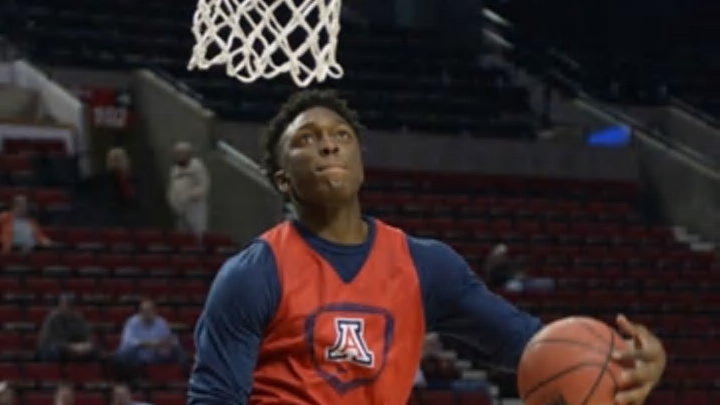Amin Elhassan of ESPN.com ranked this year’s rookie class by NBA readiness:
"Evaluating rookies is a tough proposition in the dog days of summer. We’ve already watched and rewatched hours of game footage from their collegiate/D-League/international careers, analyzed predraft intel and crossed off names from the draft board.We then tracked their performances in summer league, where they tried out their skill sets in skeleton systems with quasi-NBA talent as teammates and opponents. But none of this really gives us a good indication of who these players will be when the ball tips in late October"
"To that end, we developed the Rookie Readiness Scale as a means of measuring and quantifying the preparedness of first-year players when the season starts. “Readiness” to contribute is a nuanced concept. Some rookies have the fortune of playing on teams with low expectations and an abundance of available playing time. Others have mastered a singular skill that will be useful right away in an NBA game — like an elite touch from deep or bringing high energy with every appearance.The Readiness Scale, which is modeled after the metric-based player evaluations I utilized as a scout with the Phoenix Suns, measures a rookie’s “readiness to contribute,” as well as his projected ceiling and long-term potential role. By rating the rookies via five different categories — physical attributes, offensive skills, defensive skills, basketball IQ and intangibles — we get a composite score that gives us an idea of what type of contribution we can expect from each player this season."
He had the following to say about the Pistons’ Stanley Johnson:
"6. Stanley JohnsonTeam: Detroit PistonsReadiness: 54.0Ceiling: 72.0Johnson famously proclaimed that he was “the best player in the draft” after the Pistons selected him at No. 9. While I admire the confidence, I’m not planning on crowning him anytime soon. Johnson does come in with a certain level of polish and outclassed much of the competition in Orlando Summer League, getting to the free-throw line and putting up high-efficiency shots. Playing for Stan Van Gundy will quickly indoctrinate him into a world of higher expectations, and many of the things he got away with in college (such as overpowering his competition) won’t work as easily in the NBA. I have long-term doubts about his ability to grow in athleticism and ability, but I’d be surprised if Johnson did not end up as a high-level starter on a good team during his career."
Obviously, it calls his ethos into question a bit when he refers to Johnson as the 9th pick of the draft. But as I don’t think that’s highly relevant to this exercise, I’ll give him the benefit of the doubt and assume it was a typo.
Elhassan rated Karl Anthony-Towns, Frank Kaminsky, Jahlil Okafor, Justin Anderson, and Mario Hezonja ahead of Johnson on readiness. Given that Anthony-Towns, Okafor, and Hezonja were all off the board and Kaminsky and Anderson are generally seen as having relatively low upside due to their ages, that makes Detroit’s pick look pretty good.
Unfortunately, Johnson’s ceiling rating is a lot closer to Kaminsky and Anderson than to all the other guys on the list (it only goes ten deep, sorted by readiness):
Karl Anthony-Towns, 90.0
Emmanuel Mudiay, 85.0
Mario Hezonja, 82.5
D’Angelo Russell, 82.0
Kristaps Porzingis, 80.5
Justise Winslow, 78.5
Jahlil Okafor, 78.0
Stanley Johnson, 72.0
Frank Kaminsky, 68.5
Justin Anderson, 65.5
Upside is the most important variable for most teams drafting in the lottery. So these numbers support the conventional pre-draft wisdom, that 2015 really had a class of seven. It’s nice that Johnson is rated significantly higher than the upperclassmen drafted after him, but he’s probably rated on that count more in the range of Willie Cauley-Stein, Myles Turner, Trey Lyles, and Devin Booker than any of those seven.
Johnson has done everything that we could possibly ask of him since being drafted. But he’ll have to continue that play in the regular season before he wins over the majority of analysts and fans. It is the exception who read so much into his summer league performance as to assume that he is a top-tier rookie prospect.
For instance, Kevin Pelton underwent a similar exercise, ranking rookies by projected impact in this coming season and Johnson missed the top ten entirely:
1. Karl Anthony-Towns
2. Frank Kaminsky
3. Delon Wright
4. D’Angelo Russell
5. Kristaps Porzingis
6. R.J. Hunter
7. Willie Cauley-Stein
8. Jahlil Okafor
9. Cameron Payne
10. Sam Dekker
Obviously, these sorts of rankings are highly speculative, as shown by the fact that the top ten lists only have five names in common. And who knows what Pelton thinks of these players’ ceilings. But don’t be disappointed if Stanley Johnson is not exactly a Rookie of the Year front-runner. That’s not where most see him apart from Pistons fans. And most fan bases have overly optimistic projections concerning their recent draftees. Besides, his long-term development is more important anyway.
Next: Which new Detroit Piston will have the biggest impact?
